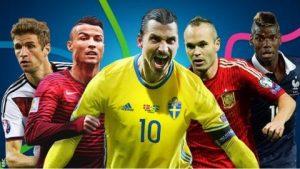
In line with the popular movie-based expression ‘I know what you did last summer’, since last Friday we may be popularizing ‘I know what you did last evening’. For many this would imply the obvious—namely football (soccer)! Yes, the EURO 2016 has started, which means watching football matches, discussing teams’ odds to win, and reading about football in all major media headlines. I am an engaged fan myself, but apart from my sports interest this tournament spurs my professional interest as well.
First of all, it is interesting to recognize my multicultural identity when cheering for teams. Given my German descent and long-time residence in Spain, I find it quite difficult not to support at least these two national teams. Hence, Go Germany, Go Spain! And if the two meet in the final, my German heritage would still be overpowering 😉
Second, the European Championships in this global sport are a great opportunity to speak about globalization and multiculturalism as well. Indeed, pretty much every match is a great display of global blending. Just think how many of the participating national teams can be considered ‘truly national’ (ethnicity, not citizenship wise)? For example, the makeup of the Swiss national team is predominantly immigrant-based, as only 3 of the starting 11 players do not have an immigrant background. The German newspaper Die Welt illustrates what the Swiss national team would look like without players of immigrant backgrounds, which becomes an especially interesting notion in light of recent immigration quotas approved in Switzerland. Likewise, French, Belgian and German squads are great examples of beneficial multiculturalism, a vision so rarely pronounced today amid all the anti-immigration and anti-Muslim sentiments. As suggested in a recent Washington Post article, this tournament can show the power of multiculturalism, as ‘some of the highest-profile squads reflect national cultures that are defined not by narrow identities but by diversity and immigration’.
Third, apart from this visibly vibrant interplay between citizenship and identity, a closer look at national teams also reveals the labor mobility aspect of globalization. Although national players have come together for the EURO 2016 tournament, on the daily basis the majority of them play for clubs abroad. As described in a recent Huffington Post article, only 37% of athletes play in their domestic league, while in most cases the national team is a selection of players from many different leagues. For example, in the case of Slovakia and Sweden the 23 national players come from clubs in 13 different countries, while Iceland and Ireland have no domestic players at all. The scope of global mobility within the football labor market is also reflected in the fact that athletes in the 24 national teams that participate at the EURO 2016 come from 36 different national leagues across five continents. Thereof, many of EURO 2016 footballers are essentially foreign born European nationals, who expatriate not only within Europe, but also to America, Australia and Africa. As the Huffington Post article puts it, ‘what this all shows is that the European Championship is an increasingly global and globalized event’.
I would say that EURO 2016 also shows the great achievements of diversity, celebrates multicultural cooperation, and unites with a shared passion. Football fans cheering for their national teams feel and express a sense of national identity, and this is where the culturally colorful vision of the national teams can become accepted and identified with. The makeup of national squads redefines what it means to be ‘German’, ‘French’ or ‘European’ in general. Hence, is there anything else to pay attention to apart from brilliant passes and spectacular goals? Amid all the immigration and multiculturalism worries, could such a popular event become the cultural space to promote the inclusive and united idea of Europe again?


I love the fact that the championship celebrated multiculturalism. It is awesome.
We are all one big family. Love that championship acknowledges that. Great feeling.
Yep, very true. Players like Mesut Ozil and Jerome Boateng wouldn’t be illegible for the German national team too, if not for immigration. It would be interesting to see what the squads would have looked like with pure nationals. I assume Spain’s would be the strongest!
and portugal in the winner euro 2016